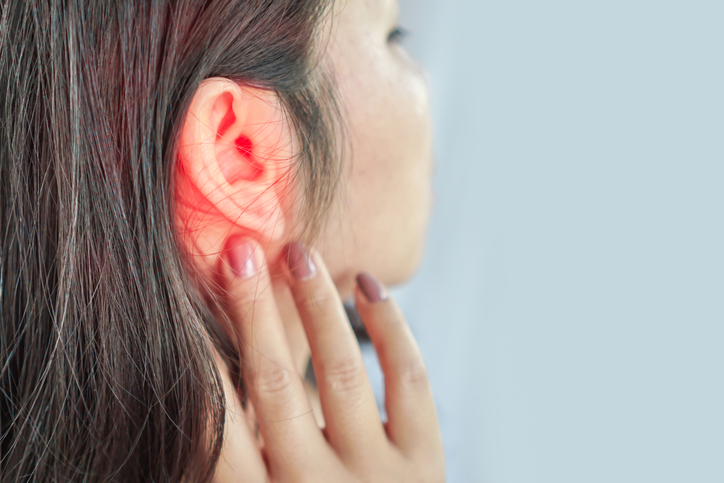Fluid accumulation in the ear that results in obstructions and inflammation is the primary cause of ear infections. Our ear is divided into the inner ear, middle ear, and outer ear. Even though any of these areas can be infected, bacterial infections of the inner ear are highly unusual. Bacteria, viruses, and fungi can cause ear infections when they enter one of the three areas of the ear. Colds and allergies may trigger ear infections as well. In most cases, ear infections will go away on their own in a week or two.
Adult Outer Ear Infection Symptoms
- Ear discomfort.
- Inflammation and redness in the ear canal
- Ear canal itch
- Peeling or flaky skin
- More serious infections can cause the ear canal to swell, which can cause hearing loss, a fever, or ear drainage that seems to have pus in it.
Experienced ENT specialists would use an otoscope to examine the ear canal to identify an outer ear infection. An otoscope is a tool with a light on the end that makes it easy to see inside the ear.
How to avoid Outer Ear Infections?
- Keep your ears dry and clean all the time to reduce the risk of developing outer ear infections.
- Never insert anything into your ear canal.
- After swimming or taking a shower, gently dry your ears. You can simply be leaning to one side and let the water drain.
Outer Ear infection treatment for adults
Adults with different types of ear infections will receive different treatments from your ENT doctor. Swimmer’s ear, also known as otitis externa, is another name for outer ear infections. Typically, outer ear infections occur in the ear canal, which extends from the outside of the ear to the eardrum. Outer ear infections could result from swimming, taking a bath in water that is not clean, or damaged skin that has an open wound. When a moist environment supports the growth of these organisms, infection is typically the result.
OTC (over-the-counter) meds to relieve the pain from ear infections.
- Pain killer for ear infection: Ibuprofen or Advil.
- Specific ear drop for swimmer’s ear: Debrox Swimmer’s Ear.
- Allergy symptom relievers.
Prescription Medications for ear infection.
- Antibiotic and steroids ear drops: Ciprodex
- Use prescription ear drops exactly as directed by your local ENT doctor.
Middle ear infection
The middle ear travels from behind the eardrum to the oval window (the area between the middle ear and inner ear). The middle ear has three little bones, known as ossicles, which are critical for hearing. The Eustachian tube, also known as the auditory tube, connects the middle ear to the throat. The purpose of the eustachian tube is to circulate air and balance the pressure in the middle ear. The fluid in the middle ear area drains into the throat.
Middle ear infections usually follow an upper respiratory infection or a cold. Middle ear infections also occur in people with allergies or enlarged adenoids (tissue in the throat and nasal cavity), which can damage the auditory tube’s proper operation. The auditory tube is the entry point for bacteria or viruses. As a result, the auditory tube may swell and become mucus-blocked, obstructing middle ear drainage and ventilation.
Primary symptoms for middle ear infections
- Earache (which can get worse in the morning or keep you up at night)
- Hearing loss
- Hearing difficulties
- Fever
Middle Ear infection treatment for adults
While middle ear infections generally go away on their own, the focus of the treatments is mainly on symptom management to ease discomfort.
OTC (over-the-counter) painkillers to lessen the discomfort.
- Ibuprofen
- Acetaminophen
- These drugs can also lower the fever from middle ear infections.
Prescription medication for middle ear infections.
- Antibiotics work only with middle ear infections that are caused by bacteria.
- It’s not always straightforward to pinpoint the source of a middle ear infection. ENT doctors may recommend antibiotic treatment or wait to see if the infection goes away on its own.
Inner Ear Infection
Within the temporal bone, the inner ear is situated adjacent to the middle ear. Semicircular canals in the inner ear play an important role in maintaining balance and equilibrium. Viruses are significantly more likely than bacteria to be the source of inner ear infections. Compared to middle and outer ear infections, inner ear infections are not as common.
Labyrinthitis and vestibular neuritis are the most typical inner ear infections.
- Labyrinthitis neuritis
The labyrinth, a network of fluid-filled sacs that aids in hearing and balance, is impacted by labyrinthitis. Both hearing loss and vertigo, sometimes known as dizziness, can result from labyrinthitis.
- Vestibular neuritis
The vestibular nerve is impacted by vestibular neuritis, an inner ear infection that typically results in balance problems and dizziness. It won’t cause a hearing problem.
Adults Inner Ear infection treatment
OTC (over-the-counter) painkillers for nausea and vertigo due to inner ear infections.
- Benadryl
- Antivert
- Over-the-counter, meds can lessen the symptoms of an inner ear infection, but they do not cure the infection.
Prescription medication for inner ear infections.
- Antinausea to reduce nausea
- Steroid medications: Prednisone for inflammation.
- Antibiotics or antivirals for inner ear infection itself.
What is the fastest way to get rid of an ear infection in adults?
Your doctor may recommend antibiotics as an ear infection treatment. Antibiotics will be necessary if you have a bacterial ear infection. Antibiotics are the most effective approach to effectively treat a bacterial infection and stop it from spreading to other body parts.
Do I need antibiotics for ear infections in adults?
A lot of the time middle ear infections can go away. However, antibiotic treatment is required right away for severe middle ear infections or infections that continue for more than 3 days. Your doctor may advise delaying the prescription of antibiotics for a minor middle ear infection.
Can an adult ear infection go away by itself?
Minor earaches may not be cause for concern because ear infections often go away on their own. Please contact your local ENT doctors if the symptoms don’t disappear after three days or experience any new symptoms, such as a fever or loss of balance.
Experienced ENT Doctor
If you are experiencing any symptoms from ear infections, please call Dr. Madison Richardson at 310-360-9520. Dr. Richardson is a board-certified surgeon with a focus on otolaryngology. He is a leading authority on cancer of the head and neck and has more than 40 years of comprehensive experience. He specializes in helping patients with ENT issues, such as voice and swallowing issues, allergies, sleep apnea, hearing loss, sinus, nasal, and snoring issues, as well as other head and neck conditions. Schedule your appointment with Dr. Richardson today!

